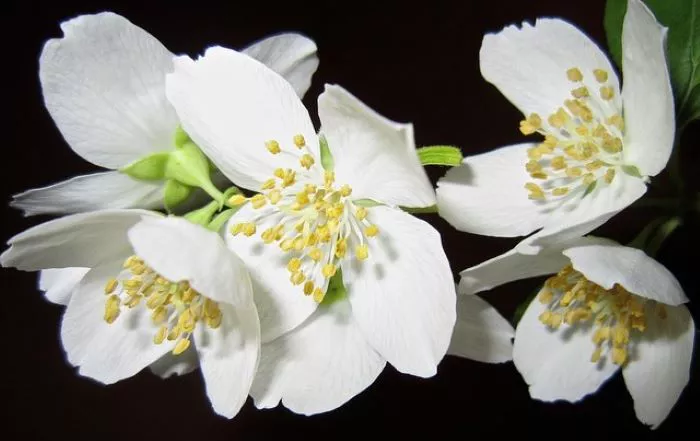Jasmine flowers are renowned for their exquisite beauty and enchanting fragrance. These delicate blooms have been cherished for centuries in various cultures around the world. Beyond their aesthetic appeal, jasmine flowers have numerous practical uses. This article will explore the various applications of jasmine flowers, including their use in perfumes, teas, culinary dishes, and traditional medicine. We will also discuss how to cultivate and preserve jasmine flowers for these purposes.
The Beauty and Fragrance of Jasmine
Jasmine belongs to the genus Jasminum, which includes over 200 species. The most commonly used jasmine flowers in various applications are common jasmine (Jasminum officinale) and Arabian jasmine (Jasminum sambac). These flowers are characterized by their small, star-shaped petals and sweet, intoxicating scent. Their fragrance is often associated with romance and tranquility, making them a popular choice for gardens and floral arrangements.
The beauty and aroma of jasmine flowers have made them a staple in perfumery and aromatherapy. Their essential oils are extracted and used in various products, enhancing both personal care items and home fragrances. The versatility of jasmine flowers extends beyond aesthetics, making them valuable in numerous fields.
Jasmine in Perfumery
One of the most significant uses of jasmine flowers is in the perfume industry. The essential oil derived from jasmine is highly sought after for its rich, floral scent. Jasmine oil is often used as a base note in perfumes, providing depth and complexity to fragrance compositions. The oil is extracted from the flowers through a process called solvent extraction or steam distillation.
Perfumes containing jasmine are popular for their romantic and uplifting qualities. The scent is believed to have mood-enhancing properties, making it a favorite among perfumers. Many luxury fragrance brands incorporate jasmine into their signature scents, highlighting its timeless appeal.
Jasmine in Herbal Teas
Jasmine flowers are also commonly used to flavor teas. Jasmine tea is made by infusing green or white tea leaves with jasmine blossoms. This process imparts a delicate floral aroma and flavor to the tea. The combination of tea and jasmine creates a soothing beverage that is enjoyed by many.
Jasmine tea is not only flavorful but also offers several health benefits. It is rich in antioxidants, which can help combat oxidative stress. Additionally, jasmine tea is known for its calming effects, making it a popular choice for relaxation and stress relief. Drinking jasmine tea can be a delightful experience, both for the palate and the mind.
Culinary Uses of Jasmine
In addition to its use in teas, jasmine flowers can also be used in various culinary applications. The flowers are edible and can be used to enhance the flavor of dishes. They are often used in Asian cuisine, particularly in desserts and rice dishes.
Jasmine flowers can be used to infuse syrups, sauces, and dressings. Their sweet and fragrant notes can elevate the taste of various dishes. For example, jasmine-infused rice can add a unique flavor to a meal, while jasmine syrup can be drizzled over desserts or used in cocktails.
When using jasmine flowers in cooking, it is essential to ensure that they are free from pesticides and chemicals. Fresh, organic jasmine flowers are the best choice for culinary applications.
Traditional Medicine and Aromatherapy
Jasmine flowers have a long history of use in traditional medicine. In various cultures, jasmine has been used for its potential health benefits. The flowers are believed to possess anti-inflammatory, antiseptic, and calming properties. Jasmine oil is often used in aromatherapy to promote relaxation and reduce anxiety.
In traditional Chinese medicine, jasmine is used to support digestive health and alleviate symptoms of stress. The calming aroma of jasmine is thought to help improve mood and promote restful sleep. Jasmine essential oil can be diffused in the air or added to bathwater for a soothing experience.
Cultivating Jasmine for Personal Use
To enjoy the many benefits of jasmine flowers, it is essential to cultivate them properly. Jasmine plants thrive in warm climates with plenty of sunlight. They prefer well-draining soil rich in organic matter. Regular watering is crucial, as jasmine plants like to stay moist but not waterlogged.
Pruning is also important for maintaining healthy jasmine plants. Regular pruning encourages bushier growth and more abundant flowering. Jasmine can be grown in gardens, containers, or as indoor houseplants, depending on the species.
Preserving Jasmine Flowers
If you wish to use jasmine flowers for culinary or aromatic purposes, preserving them is essential. Fresh jasmine flowers can be dried for later use. To dry jasmine flowers, simply lay them in a single layer on a clean, dry surface away from direct sunlight. Once fully dried, they can be stored in an airtight container.
Dried jasmine flowers can be used in teas, potpourri, or as a natural fragrance in sachets. Additionally, jasmine flowers can be infused in oils or syrups for culinary applications. Preserving jasmine flowers allows you to enjoy their beauty and fragrance throughout the year.
Conclusion
Jasmine flowers are not only beautiful but also versatile in their applications. From perfumery to culinary uses and traditional medicine, jasmine offers a wide range of benefits. Understanding how to cultivate and preserve jasmine flowers can enhance your experience with this delightful plant. Whether you use jasmine for its fragrance, flavor, or health benefits, these flowers continue to hold a special place in cultures around the world. By incorporating jasmine into your life, you can enjoy its many wonders and enrich your daily experiences.


